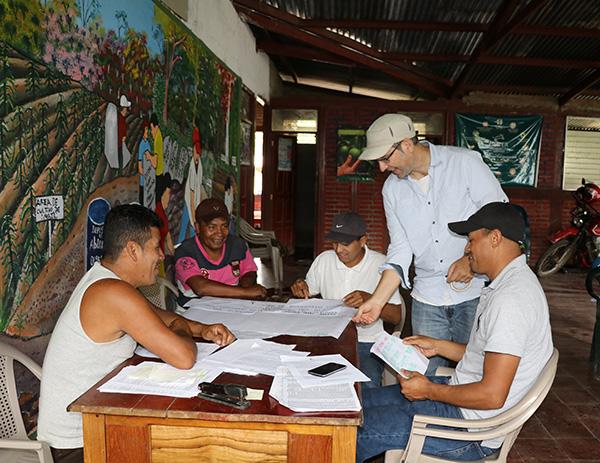Community Partnerships for Environmental Justice

Through SCU’s Environmental Justice for the Common Good Initiative, faculty member Chris Bacon has been a part of many successful food justice projects working towards a more sustainable world.
by Sarah Stoddard ’23
Santa Clara University’s Environmental Justice for the Common Good Initiative, or the EJCGI, has been behind countless projects related to food justice, water justice, climate justice, strengthening environmental justice law, and more. Through community-driven research, collaboration, and engagement, the EJCGI aims to promote environmental justice and has initiated work with numerous organizations to make changes for the good of the community. SCU’s Chris Bacon (Environmental Studies and Sciences) has been involved since the very beginning. Over the years, he has worked on numerous projects both in the local community and on a global scale, two of which are great examples of successful projects centered around food justice.
For more than 20 years, Bacon has been doing work in Nicaragua. Of many community-based research projects he has worked on in this region, one, in particular, stands out to him. That project helped smallholder coffee farmers in northern Nicaragua navigate food insecurity during periods of seasonal hunger. These farmers grow coffee crops for export and other crops for subsistence such as corn, beans, fruits, and vegetables. However, low prices received for their harvests, small landholdings, and frequent hazards related to climatic change and unfair markets means that this is often not enough to secure sustainable livelihoods.
With complimentary support from the EJCGI and many other partners, Bacon, along with EJCGI research coordinator Maria Eugenia Flores Gómez and an interdisciplinary team of SCU faculty members and student researchers, partnered with the smallholder cooperative that represents these farmers to aid in developing strategies for agroecological farm diversification and the reduction of seasonal hunger. This diversification aims to build and strengthen sustainable farming practices by using agroecology to support local food systems and maintain ecosystem services. In addition to this project, Bacon has also served as the principal investigator for “a National Science Foundation funded project to assess food and water security among these smallholders in the context of climate change and other hazards.” Working on the issue from this angle was essential because the farmers’ crops are dependent on rainwater and therefore are subject to the negative effects of changes in the climate. Both of these projects have involved over forty SCU undergraduate student research assistants and play critical roles in the work towards climate justice in the region.
Farmers and residents in Nicaragua have a very small carbon footprint compared to an average U.S. citizen. But the issue is, as Bacon says, that “the countries that have produced some of the least carbon dioxide, which accelerates global warming, are suffering some of the biggest negative impacts of climate change.” The climate change problems Nicaraguans are experiencing are tied to emissions primarily from Europe and the U.S. “It’s a real issue of climate injustice,” Bacon explains. Overall, the people in this region suffer from an array of hazards such as fluctuations in commodity prices, pest outbreaks, social exclusion, and, of course, changes in the climate. “We’re trying to help them identify strategies and practices to build resilience under these challenging circumstances,” Bacon says, explaining the main goal for his work in this region.
Another project, which started with support from the EJCGI, addresses the same issue of food insecurity but is focused on our local area. Amidst the COVID-19 pandemic and the California wildfires, Bacon and his colleagues realized that there was a lack of collaboration between food justice organizations in the South Bay. With support from the Initiative, they organized a workshop that brought together many local representatives from public health departments, farms, and universities to address this issue. The group continues to meet regularly to share resources and collaborate with different organizations as they work to tackle food insecurity.
As public health orders closed many businesses over the past year, local farmers also suffered since many of their sales were to local restaurants. One of the success stories of the collaborative workshop organized by the EJCGI is Farm Fresh Food Relief, a project developed by Fresh Approach in partnership with Pie Ranch. These two organizations “linked Bay Area farmers to community groups that are distributing much-needed food boxes to people’s doorsteps in some of the lowest-income census tracts across the Bay Area,” Bacon explains. Over a period of several months, this project brought a huge amount of fresh produce to those in need, exemplifying the importance of working towards food security and food justice. Currently, a participatory assessment is being developed to assess farmer economic development as a result of the project. This will help to evaluate the project’s success and formulate a plan for what it could look like in the future.
This is just a small glimpse into the incredible work that the Environmental Justice for the Common Good Initiative has done. The Initiative is constantly developing new innovative projects and working to implement environmental justice, food justice, climate justice, and more in all areas where it is needed. From collaborations within the local community to research projects across the world, the EJCGI will continue to find creative solutions to problems, help those in need, and work towards justice for the good of the community.